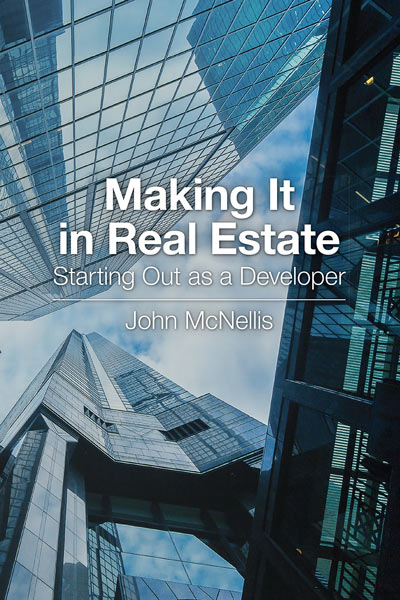This book was not quite what I expected. It’s a quick read (only 96 pages!) and fill with lots of stories, almost as if you’re sitting down for a fireside chat conversation with the author John McNellis, who is a retail developer in Northern California. You can definitely tell his personality shines through. I bought it on sale through Urban Land Institute otherwise I’m not sure if I’d pay the full $19.95 retail price. Then again, most ULI material is kind of pricey.
John covers his quick takes on various topics common to what a developer will face day to day such as financing, dealing w/ the politics, consultants, working with brokers, and much much more. The anecdotes are a good primer for someone thinking about getting into development. I did get many valuable nuggets out of the book though, most notably our current underwriting criteria to hit at least 1% over the prevailing market cap rate if we’d take on a project or not. It made perfect sense to me. If we’re going to take on the risk and wait out the time to stabilize the asset then we should be compensated for it. Otherwise we might as well just go buy a turn-key apartment. If we can build to 2% over the cap rate then it’s a no brainer that we should sell and keep the capital turning over.

Notable Quotes
“If your dissatisfaction is with the job itself–and not your income–you should quit. That is, if you can afford the cash flow hit. If you’re an entrepreneur at heart and the only decision you’re making at work is where to park in the morning, quit. If you can cobble together a year’s worth of living expenses and go into business and fail, what’s your downside? Merely the salary loss from your crappy job. And if you have to white-flag it back to the corporate world, you will be more valuable because of your experience.” — On whether to quit your job
“In my experience, those who start a business just to get rich almost never succeed.”
“Greed is not good enough”
“In baseball, the difference between a single and a home run is how hard you swing the bat; in real estate, it’s how much leverage you use.”
“If there’s any way a seller will meet you, do it; become his new best friend. Even if he’s tighter than a clam, you will learn something merely by visiting him at his office” — on buying properties. This resonated with me because I heard something similar from my business partner’s uncle who is a developer as well.
“If you’re going to lose $50,000 in due diligence costs, walk away from deals that turn out to be worm-holes. This is easy advice to give and hard to follow, but to succeed, you have to learn when to leave your ante on the table.”
“The trick to getting the highest quality work from consultants is this: hire the most experienced person you can afford who will actually do your work.”
“Think Noah’s ark. You need two of each [consultants]–two contractors, two architects, two engineers, two escrow officers, and so on. And they should know about one another. Why? Because, putting aside competition’s salutary effects on service and cost, you need a backup plan. Life trumps business and, sooner or later, your favorite consultant will be unavailable to you, perhaps at your deal’s most critical moment.
“A correction occurs when others get creamed, a crash when you do”
“Alternative interpretation of the IRR acronym such as “inflated rate of return” or “I rationalize risk” should come to the mind of anyone confronted with reams of spreadsheets predicting rising rents, falling expenses, zero vacancy factors, and impressively low cap rates.”
“The only way for a real estate mogul to sell without triggering this [capital gains] tax–dying–has yet to be widely embraced.”
“You need an open relationship with three bankers at three different banks. That way, the lights are always on somewhere.”
“Whether raw or improved, land has no innate value. Rather, it has a cost. Even with an empty field, you reap property taxes, liability insurance, and periodic fire prevention measures. Land’s only economic value is the income it receives after the costs required to produce that income are paid.
“If you don’t have any problems, you don’t have any business.”
Pick this up for a quick read and see what John describes is interesting to you to help you explore or decide if getting into real estate development is right for you.





